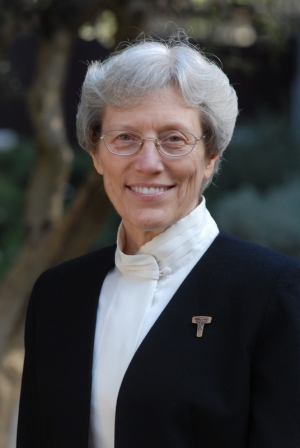
Speaking to some 260 bishops gathered in synod in Rome last week, a U.S. Catholic sister said the prelates need to be aware that “today there are people of our Catholic faith and tradition who are hurting.”
Sr. Mary Lou Wirtz, president of the International Union of Superiors General, an umbrella group for nearly 2,000 leaders of women’s religious communities across the world, also told the bishops that many Catholics have left the church “because they cannot find a place to belong.”
Wirtz, who is also the general superior of the Daughters of the Sacred Hearts of Jesus and Mary, gave her remarks Oct. 17 during a session of the synod, whose topic is “The New Evangelization for the Transmission of the Christian Faith.”
Ongoing from Oct. 7 until Oct. 28, the synod has seen the bishops focus on everything from how the church relates to Islam, the struggles of liturgical translation, and the violence in Syria.
In her remarks, Wirtz also encouraged the bishops to consider men and women religious as “more than a resource,” and rather as a “prophetic presence and witness in the church.”
Following are the full text of Wirtz’s remarks to the synod, as provided by her to NCR.
Wirtz begins by referencing the points she plans to address in the synod’s Instrumentum Laboris, the working document which was prepared before the assembly as an outline of sorts of the points it would consider.
Brothers and Sisters,
I would like to address # 48 and # 82 in the Instrumentum Laboris.
Today there are people of our Catholic faith and tradition who are hurting.
Some have already left our institutional church because they cannot find a place to belong, or they no longer find sufficient meaning for their lives. Others remain within the church, but are also struggling and searching for something that nourishes their soul, for a pastoral presence to help them work through the challenges of today’s world.
Families and individuals long to dialogue about their concerns in an open and safe atmosphere where they can share without judgment what is burdening their hearts. A pastoral presence of our church is needed here.
How can we meet the needs of our society today if we are not open to listening to those among us who are hurting, and to those living on the margins? Many are spiritually hungry, including young people and others who are active in their service within the church.
They are also looking for a place where they can be spiritually nourished and supported. How do we provide for them?
When Blessed Pope John XXIII called the Second Vatican Council he said that the church was to become “more pastoral and merciful”. Yet today, some who when they turn to the church in the midst of their pain, are alienated by judgmental attitudes or issues of power and control.
This only pushes them further away. Can we allow ourselves to enter into the pain of our people?
In my years as a Pastoral Counselor in hospital settings, listening to the medical personnel, patients and families, I quickly learned that so often what people needed most was someone with whom they could pour out what was weighing on their hearts.
Answers were not always needed for them, but only a listening presence with compassion.
This brings me to a second point, addressing # 82 of the Instrumentum Laboris, in which religious and lay movements are referred to as “resources” in the church. I firmly believe that religious are more than a resource.
For centuries, we religious have been a prophetic presence and witness in the church. This recognition seems to be minimized in the current conversations regarding evangelization. Especially in mission areas or areas where the church has a minimal presence, religious are often the first contact with the people.
In many cases religious are the ones who prepare the catechists and others for their service in the church. The demographics of religious life are shifting, but religious life as a witness within the church is alive and well and will continue to be so!




